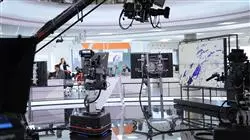University certificate
The world's largest faculty of journalism and communication”
Introduction to the Program
A high-quality preparatory journey through Audiovisual Products: Theory and Review”

To work in the audiovisual sector, it is essential to have a thorough knowledge of an industry that moves in its own unique way. Over the course of the various topics that make up this Professional master’s degree, all the fields in which the audiovisual product is developed will be discussed.
To this end, it is essential to unravel the factors involved in visual communication. Obviously, the image and its forms of expression are the basis of the audiovisual product, although they must compliment other parts of the message. Managing the keys to their communication is essential to speaking the language of this competitive industry.
But it is not only the keys to the visual element that are important. During this Professional master’s degree you will study the characteristics of cultural journalism and develop your knowledge of contemporary artistic movements and other topics related to the international movement in which the audiovisual product is created, produced, distributed and consumed.
In this sense, special attention will be devoted to the film industry in the most diverse parts of the world, unravelling the relationship between the social and political movements and audiovisual creation.
A compendium of knowledge that can be applied to audiovisual production, with a contemporary vision of what is happening right now in the televisual arena in terms of formats and genres, and in terms of consumption and audiences.
Master the principles of Audiovisual Products: Theory and Review and incorporate the most up-to date knowledge in this field into your learning”
This Professional master’s degree in Audiovisual Products: Theory and Review contains the most complete and up-to-date educational program on the market. Its most notable features are:
- The latest technology in online teaching software
- A highly visual teaching system, supported by graphic and schematic contents that are easy to assimilate and understand
- Practical cases presented by practising experts
- State-of-the-art interactive video systems
- Teaching supported by telepractice
- Continuous updating and recycling systems
- Autonomous learning: full compatibility with other occupations
- Practical exercises for self-evaluation and learning verification
- Support groups and educational synergies: questions to the expert, debate and knowledge forums
- Communication with the teacher and individual reflection work
- Content that is accessible from any fixed or portable device with an Internet connection
- Complementary documentation banks permanently available, even after the course
A contextualized and realistic learning experience that will allow you to put your studies into practice through new skills and competences”
Our teaching staff is made up of working professionals. In this way, TECH can fulfil their objective of providing you with an up-to-date program. A multidisciplinary team of professors trained and experienced in different environments, who will go through the theoretical knowledge in an efficient way, but, above all, will place the practical knowledge derived from their own experience: encompassing all facets of this specialization, at the service of the academic course.
This mastery of this subject is complemented by the effectiveness of the methodological design of this Professional master’s degree. Developed by a multi-disciplinary team of e-learning experts and integrating the latest advances in educational technology. In this way, the professional will be able to study with a range of comfortable and versatile multimedia tools that will give them the operability they need in their area of focus.
The design of this program is based on Problem-Based Learning: an approach that views learning as a highly practical process. To achieve this remotely, we will use telepractice: With the help of an innovative interactive video system, and learning from an expert you will be able to acquire the knowledge as if you were actually dealing with the situation you are learning about. A concept that will allow you to integrate and reinforce learning in a more realistic and permanent way.
An analysis of the different fields in which the message moves and through which the message is produced in the audiovisual environment”

A practical and realistic course that will allow you to advance gradually and safely”
Why study at TECH?
TECH is the world’s largest online university. With an impressive catalog of more than 14,000 university programs available in 11 languages, it is positioned as a leader in employability, with a 99% job placement rate. In addition, it relies on an enormous faculty of more than 6,000 professors of the highest international renown.

Study at the world's largest online university and guarantee your professional success. The future starts at TECH”
The world’s best online university according to FORBES
The prestigious Forbes magazine, specialized in business and finance, has highlighted TECH as “the world's best online university” This is what they have recently stated in an article in their digital edition in which they echo the success story of this institution, “thanks to the academic offer it provides, the selection of its teaching staff, and an innovative learning method aimed at educating the professionals of the future”
A revolutionary study method, a cutting-edge faculty and a practical focus: the key to TECH's success.
The most complete study plans on the university scene
TECH offers the most complete study plans on the university scene, with syllabuses that cover fundamental concepts and, at the same time, the main scientific advances in their specific scientific areas. In addition, these programs are continuously being updated to guarantee students the academic vanguard and the most in-demand professional skills. In this way, the university's qualifications provide its graduates with a significant advantage to propel their careers to success.
TECH offers the most comprehensive and intensive study plans on the current university scene.
A world-class teaching staff
TECH's teaching staff is made up of more than 6,000 professors with the highest international recognition. Professors, researchers and top executives of multinational companies, including Isaiah Covington, performance coach of the Boston Celtics; Magda Romanska, principal investigator at Harvard MetaLAB; Ignacio Wistumba, chairman of the department of translational molecular pathology at MD Anderson Cancer Center; and D.W. Pine, creative director of TIME magazine, among others.
Internationally renowned experts, specialized in different branches of Health, Technology, Communication and Business, form part of the TECH faculty.
A unique learning method
TECH is the first university to use Relearning in all its programs. It is the best online learning methodology, accredited with international teaching quality certifications, provided by prestigious educational agencies. In addition, this disruptive educational model is complemented with the “Case Method”, thereby setting up a unique online teaching strategy. Innovative teaching resources are also implemented, including detailed videos, infographics and interactive summaries.
TECH combines Relearning and the Case Method in all its university programs to guarantee excellent theoretical and practical learning, studying whenever and wherever you want.
The world's largest online university
TECH is the world’s largest online university. We are the largest educational institution, with the best and widest online educational catalog, one hundred percent online and covering the vast majority of areas of knowledge. We offer a large selection of our own degrees and accredited online undergraduate and postgraduate degrees. In total, more than 14,000 university degrees, in eleven different languages, make us the largest educational largest in the world.
TECH has the world's most extensive catalog of academic and official programs, available in more than 11 languages.
Google Premier Partner
The American technology giant has awarded TECH the Google Google Premier Partner badge. This award, which is only available to 3% of the world's companies, highlights the efficient, flexible and tailored experience that this university provides to students. The recognition as a Google Premier Partner not only accredits the maximum rigor, performance and investment in TECH's digital infrastructures, but also places this university as one of the world's leading technology companies.
Google has positioned TECH in the top 3% of the world's most important technology companies by awarding it its Google Premier Partner badge.
The official online university of the NBA
TECH is the official online university of the NBA. Thanks to our agreement with the biggest league in basketball, we offer our students exclusive university programs, as well as a wide variety of educational resources focused on the business of the league and other areas of the sports industry. Each program is made up of a uniquely designed syllabus and features exceptional guest hosts: professionals with a distinguished sports background who will offer their expertise on the most relevant topics.
TECH has been selected by the NBA, the world's top basketball league, as its official online university.
The top-rated university by its students
Students have positioned TECH as the world's top-rated university on the main review websites, with a highest rating of 4.9 out of 5, obtained from more than 1,000 reviews. These results consolidate TECH as the benchmark university institution at an international level, reflecting the excellence and positive impact of its educational model.” reflecting the excellence and positive impact of its educational model.”
TECH is the world’s top-rated university by its students.
Leaders in employability
TECH has managed to become the leading university in employability. 99% of its students obtain jobs in the academic field they have studied, within one year of completing any of the university's programs. A similar number achieve immediate career enhancement. All this thanks to a study methodology that bases its effectiveness on the acquisition of practical skills, which are absolutely necessary for professional development.
99% of TECH graduates find a job within a year of completing their studies.
Professional Master's Degree in Theory and Criticism of the Audiovisual Product
.
As a result of the technological boom, nowadays entertainment contents are mostly consumed in visual or auditory formats. However, the creation of these projects requires numerous factors such as technical, financial and logistical resources that together facilitate the design and production of these plans. Being a very relevant sector that demands specific techniques and communicative styles to obtain quality material, TECH developed a Professional Master's Degree in Theory and Criticism of the Audiovisual Product. An online postgraduate course focused on addressing the essential tools that contribute to the development of successful projects in these formats. Throughout 1,500 hours of study taught by an exceptional faculty, students will learn about the characteristics of cultural journalism, contemporary artistic movements and other topics related to the international factor in which a project is created, produced, distributed and consumed.
Specialize in the critical and theoretical aspects of audiovisual planning
.
At TECH's School of Journalism and Communication, we designed a program that covers the most relevant and up-to-date topics in this area. Therefore, you will have the certainty of taking a program of the highest academic quality, where you will learn the key factors that make up a visual element and determine its relationship between the social, political and historical environment. You will also delve into the structure of the audiovisual system (genres, formats), cultural industries and new communication business models. Because of this, you will be able to understand the principles of audiovisual discourse (cinema and television) in order to interpret and analyze the mechanisms that determine each production.
Take an online Professional Master's Degree
.
By taking this program you will specialize in making products through a contemporary vision based on the current audiovisual panorama, complemented by formats and genres adapted to each type of audience. You will have the capacity for cultural, social and economic analysis of television and film genres, as a consistent element in the creation and consumption of this material. Likewise, you will critically understand each production by delving into the historical, political and technological framework in which they are produced. After completing the course, you will obtain the necessary skills to examine the formal and/or narrative construction of visual and auditory narratives that allow the creation of striking projects, through an integrative perspective.







